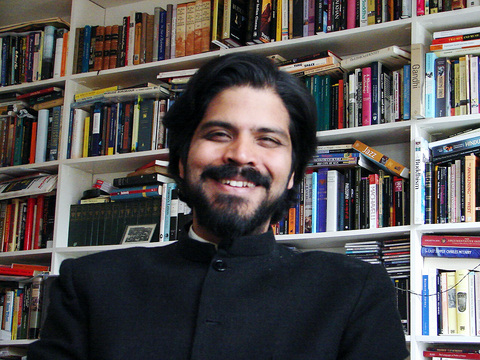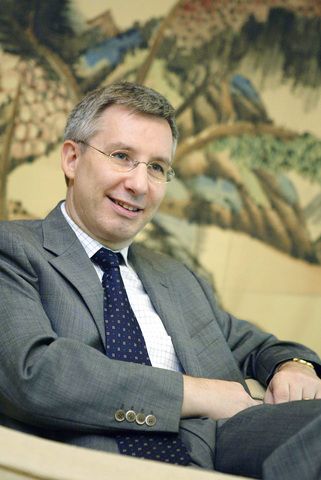Lung Ying-tai (龍應台) is disillusioned with Taiwan's political scene. Fed up with the constant partisan bickering and lunch-box battles in the legislature, the founder and president of the Lung Ying-tai Cultural Foundation (龍應台文化基金會) — a non-governmental organization (NGO) based in Taipei — hopes to provide an antidote to Taiwan's political chaos through hosting a series of lectures called Taipei Salon (台北沙龍). The lectures are conducted in English.
Begun last year, Lung's idea combines the French institution of literary salons with modern ideas on how to create a civil society — where an informed citizenry is empowered to make intelligent voting decisions, participate in politics and hold government and industry to account.
"[We] want to have an impact on society through intellectual discussion ... away from [the] narrow path of political fighting or reform," Lung said in an interview.

Creating a civil society is something that Lung knows a lot about. Appointed Taipei City's first cultural csar in 1999, during her four-year term she designed and implemented a cultural policy that increased the visibility of the arts in the city. With 15 book titles to her name, the current chair of arts and humanities at Tsing Hua University frequently publishes critical essays in European magazines and newspapers on both sides of the Taiwan Strait.
This month's lectures begin tomorrow with Jean-Claude Poimboeuf, Director of French Institute in Taipei, who will discuss how the French maintain their unique cultural identity in the age of globalization.
On March 17, Pankaj Mishra, a novelist and contributor to the New York Times, will talk about India's path to democracy. This month's series will end on March 24 with Julian Nida-Ruemelin — professor of political theory and philosophy at the University of Munich and a former minister of culture — who will discuss the relationship between globalization and democracy.

PHOTOS COURTESY OF LUNG yINGTAI CULTURAL FOUNDATION
Past speakers include David Plott, the former editor-in-chief of The Far Eastern Economic Review and current professor of journalism at the University of Hong Kong, and Jurgen Gerbig, Director of the German Cultural Center in Taipei.
By conducting the lectures in English, Lung hopes that foreigners will attend the lectures and participate in the discussions.
"I suspect [expats] have been closed up — because of the language barrier — in their own circles, which is not fair because they are citizens of the city," she said. "But so far we have not been able to reach the expat community because we don't know where they are."
Though foreigners are invited to participate, the youth of Taiwan are the real focus of Lung's salon.
"We want to get in touch with the younger generation," she said. "We are disappointed with anyone over 40 — so we decided to carry on a dialogue with people under 40," she added jokingly.
"We want to … cultivate the minds of the younger generation so that they are open-minded ... are concerned about global issues [and] ... have compassion for the weaker, whether in terms of income, resources, or in environmental areas — global citizenship in other words.
Though a tall order, Lung has found remarkable success with Taipei Salon. The last two lectures saw the auditorium at Yuehan Hall (月涵堂) packed to capacity with everyone from high school students to young professionals.
In addition to Taipei Salon, Lung's foundation has also set up a Thinkers Salon (思沙龍), a club with seminars conducted in Chinese that exposes participants to different cultures throughout the world. Under the title "What you do not know" (你所不知道的), it has covered topics such as Latin America, North and South Korea and the conflicts between the Israelis and Palestinians.
By doing so, Lung believes the youth of Taiwan will come to see they have the power to create an efficient civil society, thus furthering the island's democratization.
"We have to … focus on the younger generation and that kind of idea leads us to do what we are doing now," she said.

Towering high above Taiwan’s capital city at 508 meters, Taipei 101 dominates the skyline. The earthquake-proof skyscraper of steel and glass has captured the imagination of professional rock climber Alex Honnold for more than a decade. Tomorrow morning, he will climb it in his signature free solo style — without ropes or protective equipment. And Netflix will broadcast it — live. The event’s announcement has drawn both excitement and trepidation, as well as some concerns over the ethical implications of attempting such a high-risk endeavor on live broadcast. Many have questioned Honnold’s desire to continues his free-solo climbs now that he’s a

As Taiwan’s second most populous city, Taichung looms large in the electoral map. Taiwanese political commentators describe it — along with neighboring Changhua County — as Taiwan’s “swing states” (搖擺州), which is a curious direct borrowing from American election terminology. In the early post-Martial Law era, Taichung was referred to as a “desert of democracy” because while the Democratic Progressive Party (DPP) was winning elections in the north and south, Taichung remained staunchly loyal to the Chinese Nationalist Party (KMT). That changed over time, but in both Changhua and Taichung, the DPP still suffers from a “one-term curse,” with the

Jan. 26 to Feb. 1 Nearly 90 years after it was last recorded, the Basay language was taught in a classroom for the first time in September last year. Over the following three months, students learned its sounds along with the customs and folktales of the Ketagalan people, who once spoke it across northern Taiwan. Although each Ketagalan settlement had its own language, Basay functioned as a common trade language. By the late 19th century, it had largely fallen out of daily use as speakers shifted to Hoklo (commonly known as Taiwanese), surviving only in fragments remembered by the elderly. In

Lines between cop and criminal get murky in Joe Carnahan’s The Rip, a crime thriller set across one foggy Miami night, starring Matt Damon and Ben Affleck. Damon and Affleck, of course, are so closely associated with Boston — most recently they produced the 2024 heist movie The Instigators there — that a detour to South Florida puts them, a little awkwardly, in an entirely different movie landscape. This is Miami Vice territory or Elmore Leonard Land, not Southie or The Town. In The Rip, they play Miami narcotics officers who come upon a cartel stash house that Lt. Dane Dumars (Damon)